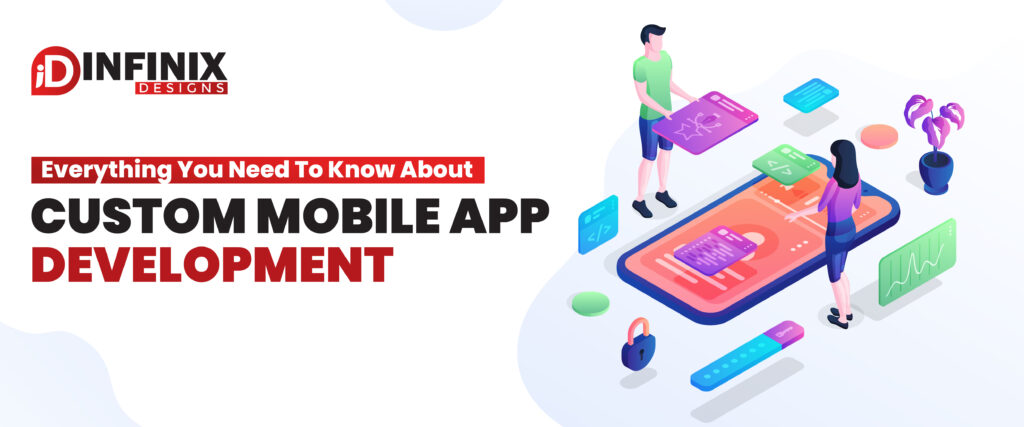Everything you need to know about custom mobile app development
With having more than 78% users of smartphones, the demand for custom mobile app development has been trending upward for years. Many people are using different mobile applications based on their needs and preferences. These applications fall in many categories and are in demand. From gaming and music apps to calendars and communication apps. These applications offer a diverse range of features that can be accessed just by one click!
Mobile apps like WhatsApp, Facebook, TikTok and Spotify have billions of users. Mobile apps like whatsapp, Facebook, tiktok and Spotify have billions of users. According to Statistica stats, people downloaded approximately 255 billion mobile applications in the year 2022.
When it comes to creating apps, businesses have varying goals in mind. Some are keen on developing the next popular platforms like TikTok or Zoom, with a strong focus on consumer-facing projects and the potential revenue they can generate. On the other hand, some businesses opt to invest in enterprise solutions that optimize internal processes. Here in this blog, we’ll discuss how these goals will be fulfilled by implying custom mobile app development.
What is custom mobile app development?
Custom mobile app development is appealing to businesses as it enables partial or full personalization to meet specific needs. Unlike generic solutions, these apps are tailored to a particular audience, enhancing their effectiveness. This customization factor makes it an attractive choice for businesses of all sizes.
HTML5, CSS, and JavaScript are frequently used in the custom mobile application to create mobile-friendly user interfaces and guarantee a seamless surfing experience. It also entails using responsive design strategies to modify the website’s structure and content to fit various screen sizes and orientations.
Types of mobile apps
There are following type of mobile application
Native Mobile Applications
Developers design native custom mobile application specifically for operating systems like iOS or Android, and users directly install these apps on their devices to use them offline. Users obtain these apps from the respective app store to leverage the full capabilities of their devices. These apps utilize the capabilities of the user’s device and they obtain them from the respective app store.
Cross-Platform Native Mobile Applications
Developers utilize a unified codebase to create these apps, which functions across multiple platforms, including iOS and Android. This streamlined approach eliminates the necessity of writing separate code for each platform, resulting in cost and time savings during app development.
Hybrid Mobile Applications
Hybrid apps are similar to cross-platform apps. Writing an app once and making it work on different platforms is possible. However, hybrid development offers an easier and less technical skill-intensive approach compared to cross-platform development. You can achieve this by utilizing basic web development knowledge or utilizing app builders.
Progressive Web Applications (PWA)
PWAs are apps delivered through the web and accessed through a browser. They don’t need to be installed on your device. PWAs offer a similar experience to native apps and can even send push notifications. However, they have some limitations in accessing certain device features.
Cross-platform apps are easier to maintain and have a broader reach, but they can encounter performance and security issues. On the other hand, PWAs are cost-effective and compatible with various devices, but they offer limited functionalities and may have certain limitations.
Comparing hybrid and native apps, hybrid apps are more cost-effective and quicker to develop. They look and feel like native apps but may have performance issues on older devices and limited features. Native apps, on the other hand, provide exceptional performance and access to all device functionalities, but they are more expensive and time-consuming to develop.
Overall, when selecting the right type of custom mobile application consider these factors such as budget, target audience, desired functionalities, and development skills.
Steps for Custom Mobile Application
The custom mobile app development process consists of these main steps. Let’s break them down:
Defining your Mobile App Idea
When starting a mobile app project, the initial phase involves gathering information about the app concept. Furthermore, this includes understanding the target audience, determining the platforms to build for, and assessing existing systems or similar apps in the market. To gain insights into project goals, timeline, and engage stakeholders such as product owners, designers, and marketing teams, the development team conducts client interviews and workshops. This collaborative approach helps gather requirements and delve into the business and market environment. Once the development team gathers all the necessary information, they shift their focus to analytics and research, which play a crucial role in the Custom mobile application process. This step involves analyzing data and conducting research to make informed decisions and set a strong foundation for the app creation.
Research and Market Analysis
Research is a crucial step in Custom mobile application. It involves analyzing the target audience, studying the competition, understanding industry standards, and learning about the business and technology requirements. By conducting thorough research, you can gather valuable insights to refine your product strategy, prioritize requirements, and create a roadmap for development. Custom mobile application helps in reducing costs, save time, and ensure that your app aligns with user expectations and business goals.
Wire framing and Prototyping
Designing the user experience (UX) for your Custom mobile application becomes a vital step in the development process. You need to envision the look and feel of your app. You can begin by sketching ideas and crafting wireframes to visualize the app’s functionality. The main goal is to create a seamless and user-friendly interface, considering how people will interact with the app.
Furthermore, acknowledging the differences between custom mobile app development and web development. Prioritizing the user experience remains crucial. To test and refine the app, create prototypes based on wireframes.
Choosing the Right Development Approach
Once the UI design is finalized, the development team takes over. During this transition, effective communication between designers and developers plays a crucial role in ensuring a seamless coding process. The development team aims to create a functional, visually appealing, and engaging app. The team composition depends on the application’s specific requirements, such as the necessity for native development for iOS and Android or cross-platform development utilizing frameworks like React Native or Flutter. Additional expertise may be required for complex backend development.
Quality Assurance and Testing
Quality assurance (QA) engineers play a crucial role in ensuring the app’s stability and quality. The development phase is the longest and most rewarding part of the custom mobile app development process. Agile development methodology is commonly employed, breaking down the process into cycles that include development, testing, and review. Custom mobile application approach allows for flexibility and transparency, with regular iterations and opportunities for feedback and adjustments. Frontend development involves bringing the UI design to life and making it functional, considering factors such as performance optimization and server-side logic. Backend development focuses on server-side engineering, including architecture, content management, data management, and integration with third-party systems. To safeguard user data, stringent data security measures are implemented. The app undergoes comprehensive testing, which includes functional, performance, and usability tests, to verify its smooth functionality, efficient performance, and seamless user experience.
Best Mobile Application Development Platforms
There are many mobile application development platforms available such as:
Flutter
With just one codebase, an open source such as flutter allow you to develop cross-platform. Flutter in comparison to other existing market solutions is a new concept. It debuted in 2017. Development was done by google. You may use flutter to develop mobile applications. These include iOS, android, Linux etc. it is an excellent selection for anyone who wants to create web applications by using sole C, C++ and dart codebase.
GeneXus
GeneXus is a low-code platform that simplifies software development and enhances productivity. It automates tasks, provides a multi-experience approach, and supports an agile, incremental development process. With a single language to cover all technologies, it is easier to learn. GeneXus has been around for 30 years, continuously evolving and utilizing Artificial Intelligence techniques. It offers a future-proof solution compatible with leading platforms, languages, and popular databases.
Microsoft Xamarin
Xamarin is an open-source framework that enables the creation of cross-platform apps for Android, iOS, and Windows. It uses C# and .NET to develop apps with a shared codebase. Xamarin allows for consistent app experiences across different platforms, resembling native deployments. It offers a wide range of developer toolkits, integrates with native APIs and backend services, and simplifies the development process by writing code once for multiple platforms.
Lumavate
Lumavate offers a user-friendly platform that enables anyone to create captivating and personalized digital experiences. These experiences deliver impactful outcomes for customers, partners, and employees alike. Additionally the platform seamlessly integrates with existing content and data tech stacks, providing a smooth and effortless experience.
Renowned brands worldwide, such as Cummins, Trinchero Family Estates, BraunAbility, Roche, Herff Jones, and many others, have benefited from Lumavate’s empowering solutions. By leveraging the platform, these brands have successfully enhanced their digital presence and achieved remarkable results.
Lumavate takes the complexity out of creating and managing engaging digital experiences, ensuring that brands can effectively connect with their target audience. With our platform, you can unlock the full potential of your digital content and data, creating experiences that leave a lasting impact.
How does a custom Mobile Application Provide Benefits for your Business?
Custom mobile application provides the following benefits:
Improved Security through Custom Mobile App Development
It’s possible that common business programs lack the security measures required to protect your data. Your information may be at danger as a result. However, when you build a customized app, you can include specific security measures designed for your business. Custom mobile app development helps in eliminating potential threats and dangers by using data encryption. Protecting your data and keeping it safe from unauthorized access becomes possible when you prioritize security and ensure that your app meets the requirements of various operating systems (OS) and application programming interfaces (APIs). This proactive approach empowers you to safeguard your data effectively.
Improved Scalability through Custom Mobile App Development
Regular apps typically have limitations when it comes to processing a large number of resources. While this may not be a concern initially, as your business expands, these generalized apps may struggle to handle the increased data load.
In contrast, custom app development offers a solution to this issue. Custom-made apps are specifically designed with scalability in mind. They are built to easily accommodate growing demands and handle larger amounts of data. This means that if the need arises, these custom apps can be effortlessly expanded and adapted to meet the increasing requirements of your business.
By opting for custom mobile app development, you ensure that your business can smoothly handle its growing operations without any hindrances caused by limitations in processing resources. This scalability advantage allows your app to keep pace with your expanding business needs effectively.
Highlighting Your Competitive Edge
ustom mobile app development is a valuable solution for businesses, particularly startups, seeking a competitive advantage. Unlike off-the-shelf solutions, custom apps offer flexibility by incorporating additional functions that can set your business apart from competitors. Custom mobile app development empowers you to emphasize and showcase the unique advantages your business possesses, effectively setting your product apart in the market. By tailoring the app to your specific business needs, you create an exceptional experience that attracts more customers and propels your business to thrive.
Moreover, by having a custom mobile application, you actively promote and highlight the special features and capabilities of your products or services. This tailored approach helps you establish a stronger market position compared to businesses relying on generic solutions. By effectively
communicating your unique selling points, you can attract a larger customer base and increase your chances of achieving success and growth. Moreover, custom mobile app development presents an opportunity to gain a competitive edge and position your business for long-term success.
Learn more about the benefits of web development in this blog
Hire an expert for end-to-end custom mobile app development only at Infinix designs. We offers
• IOS APPS
• ANDROID APPS
• GAME APPSS
• HYBRID APPS
Conclusion
Custom Mobile app development is essential for reaching and engaging a growing number of users who access the internet primarily through mobile devices. By creating mobile-friendly websites, businesses can provide a seamless browsing experience to their mobile audience, improve user satisfaction, and increase conversions.





